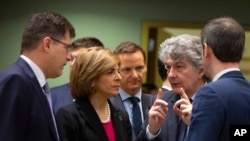European Union health ministers held an extraordinary meeting to discuss the latest developments regarding the coronavirus outbreak. The continental bloc is trying to improve its collective response to the coronavirus outbreak, aside from some members’ decision to ban the export of protective equipment such as masks.
The last time EU health ministers met, on Feb. 13, no deaths had yet been reported in Europe. Now there have been more than 110 coronavius fatalities on the continent, according to the latest figures from the European Center for Disease Control and Prevention (ECDC).
With confirmed cases being reported daily in Italy and France, some member states are moving unilaterally to protect against the outbreak, but officials say a coordinated approach is most effective.
EU health commissioner Stella Kyriakides says each state's readiness is important but so is acting in coordination.
"We need to remain calm, we need to remain focused but the greatest strength that we all have, as an EU is our solidarity. And we need to work together and work closely because it is on this strength that we would be able to overcome these difficulties,” Kyriakides said.
Some EU member-states publicly criticized countries that blocked the export of some medical supplies to protect against the coronavirus. Germany has banned the export of face masks and gloves and France has requisitioned all its own supplies.
The European commissioner for risk management, Janet Lenarcic, called on countries to consider the interests of all member states in addition to their own.
"Restrictions are possible under the treaty, they can be introduced under certain conditions. However, the commission believes that such measures should be taken in a such way that they would ensure that they would be protective equipment available to all citizens across the European Union on equal footing. We would not favor measures that would favor one member state at the expense of others," Lenarcic said.
Some EU members -- notably Italy, where at least 148 people have died as of Thursday -- have been hit harder than others and some ministers, like Italy's Roberto Speranza, called for shared resources.
"We don’t have problems at this moment. What we think is that the European level we need a coordination. Not every country, not every region will need masks at the same moment. If we have a European coordination, everyone could give a better solution to the problem with have,” Speranza said.
The European Union also increased its research funding by an additional $42 million, which together with the $11 million announced in January, will finance 17 projects involving 136 research teams from across the EU.







